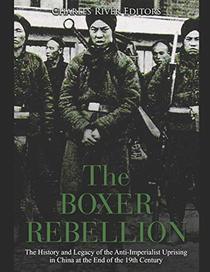This book really steps back and shows the 'big picture' regarding foreigner's relationships with China that ultimately led up to the Boxer Rebellion. Although China wasn't interested in European products, England wanted Chinese tea, porcelain, and silk. When their purchase caused a severe trade deficit (too much English silver going to pay for these items), the British decided to dump opium on the Chinese. This eventually led to the first and second Opium Wars.
Then, the Japanese and Chinese went to war over who was the most important power in the Pacific-Rim region. While the leaders were fighting, the poor were suffering from droughts and flooding. In fury and frustration with their inability to feed themselves and their families, a secret society formed amongst the poor in the northern part of China.
Initially, they came to the attention of foreigners because the Boxers killed two priests. But the Boxers were searching for the source of their growing poverty and settled on the foreigners, especially those in and near Peking. They were anti-Christian, anti-foreigner and anti-imperialists. They particularly attacked the diplomats, civilians and foreign troops of the Europeans, Japanese, British, and Americans.
When the word got out what the Boxers were doing, multinational troops rushed to rescue the foreigners before they could all be slaughtered. The weak Chinese Dynasty initially fought against the Boxers, but later aided them against the foreigners. Eventually, the Boxers brought down the leadership in China, the Qing Dynasty.
Then, the Japanese and Chinese went to war over who was the most important power in the Pacific-Rim region. While the leaders were fighting, the poor were suffering from droughts and flooding. In fury and frustration with their inability to feed themselves and their families, a secret society formed amongst the poor in the northern part of China.
Initially, they came to the attention of foreigners because the Boxers killed two priests. But the Boxers were searching for the source of their growing poverty and settled on the foreigners, especially those in and near Peking. They were anti-Christian, anti-foreigner and anti-imperialists. They particularly attacked the diplomats, civilians and foreign troops of the Europeans, Japanese, British, and Americans.
When the word got out what the Boxers were doing, multinational troops rushed to rescue the foreigners before they could all be slaughtered. The weak Chinese Dynasty initially fought against the Boxers, but later aided them against the foreigners. Eventually, the Boxers brought down the leadership in China, the Qing Dynasty.




